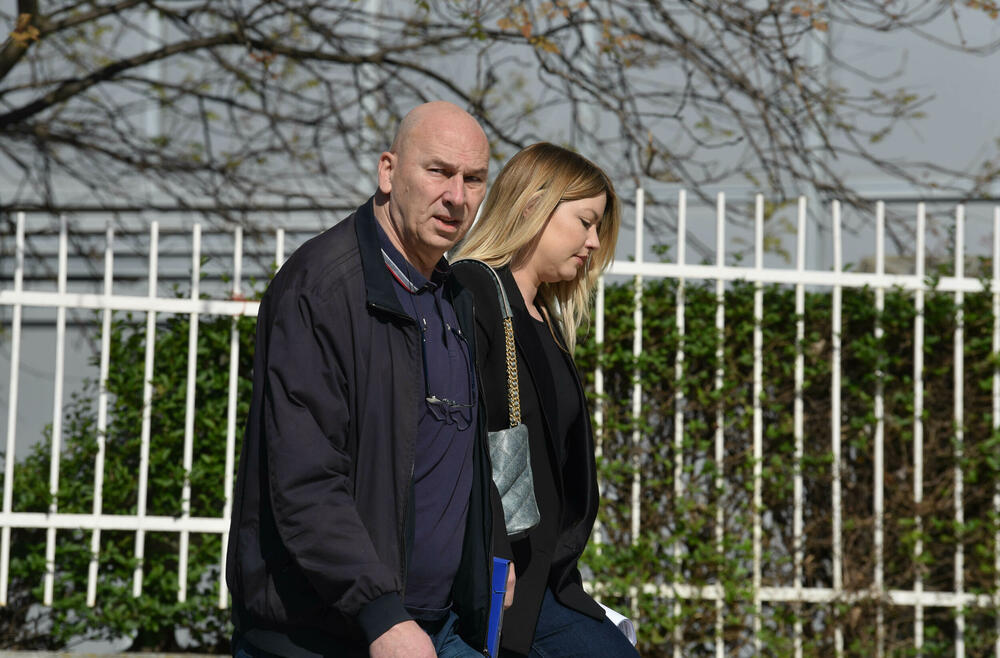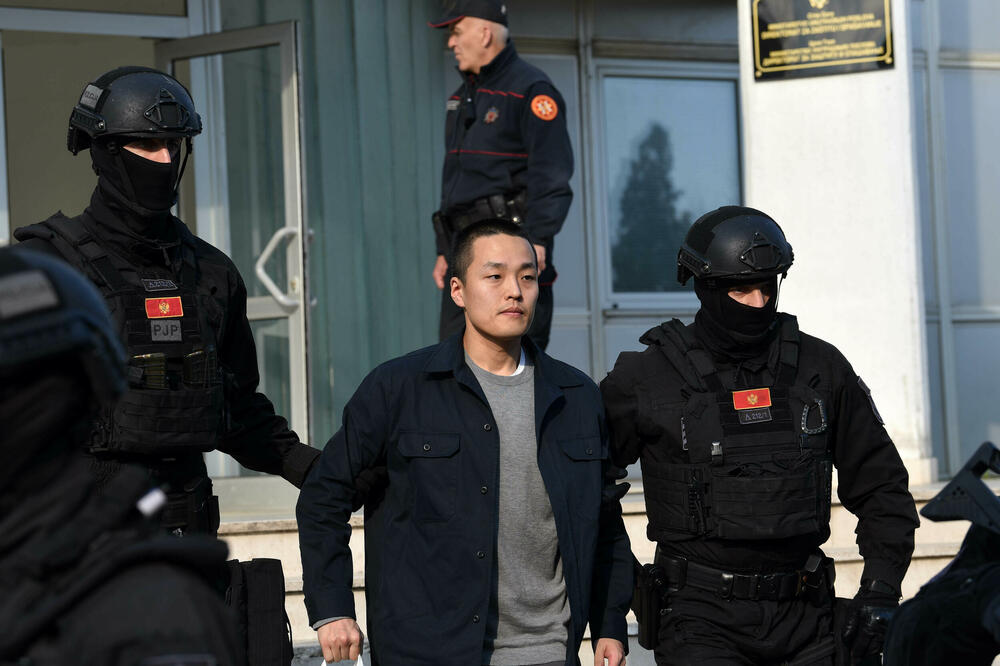Lawyers Do Kvona, Goran Rodić and Marija Radulović filed an appeal against the decision of the High Court in Podgorica, which found that the conditions for extradition of the crypto-tycoon to both South Korea and the United States of America (USA) were met.
In their appeal, Rodić and Radulović state that the decision of the High Court of April 8 is unfounded and illegal and that the provisions of the Law on International Legal Assistance in Criminal Matters are interpreted in a bizarre manner, which "was first established by the Minister of Justice (Andrej Milović), from lucrative reason, and it was applied by the High Court and the Supreme Court in an attempt to satisfy the wishes of the Minister of Justice".

They said that they are filing the appeal due to a significant violation of the provisions of criminal procedure, from Article 386 of the Criminal Procedure Code (CPC) and "wrongly and incompletely determined factual situation, from Article 388 of the CPC". They say that the reasons from the explanation are unclear, contradictory, absolutely unfounded in law, "and all with the aim of using bare force, in order to support the undisguised interests of the first instance court and the Minister of Justice".
After a secret deliberation and vote on April 8, the Supreme Court passed a verdict approving the request to protect the legality of the Supreme State Prosecutor's Office (VDT). This annuls the earlier rulings of the High Court in Podgorica and the Court of Appeal and returns the case to the High Court in Podgorica, as a first instance, for a re-decision of who will extradite Do Kwon - the USA or South Korea, who are looking for him on charges of crypto-fraud.
Marija Raković, independent advisor for public relations of the High Court, told "Vijesta" at the time that the final decision on who will be extradited to the crypto-currency king will be made by the Minister of Justice, Andrej Milović.
The decision to extradite Do Kwon to South Korea, not the USA, was made by the High Court on March 20 of this year, following a shortened procedure, and then confirmed by the Court of Appeal. That verdict was final. The VDT reacted to it on March 21 by asking the Supreme Court to protect the legality of the Do Kwon case. Previously, the High Court ruled on February 22 that the South Korean citizen should be extradited to the US, but the decision was overturned by the Court of Appeals.
Do Kwon and his business partner Han Chang Joon were arrested on March 23 last year at the Podgorica airport when they used forged Costa Rican passports. Jun was extradited to South Korea in February this year, and Do Kwon remained in prison in Spož. After serving his four-month prison sentence, he was taken to a shelter for foreigners near Podgorica.
Rodić and Radulović state in their appeal that the request for the protection of the legality of the VDT was submitted to the detriment of the defendant, and in view of this, the Supreme Court could not make a decision on modifying or canceling final court decisions.
"Such a verdict does not honor the judges of the Supreme Court, and it is not the first time that the Supreme Court, outside of the law, made decisions for other people's needs. At the same time, aware of the illegality of the decision, they did not take responsibility for changing the final decision and submitting the case to the Ministry of Justice for further decision-making, but they are trying to transfer it to the lower courts", the lawyers claim.
They also state that a copy of the request for the protection of legality was delivered to the defense by e-mail 20 minutes before the start of the session of the Supreme Court panel. "Not only was the defense not given a reasonable opportunity to present arguments regarding the submitted request for the protection of legality, but the defense submission was ignored precisely because the decisions of the Supreme Court of Croatia in identical situations were attached to it (when the request for extradition was submitted by several countries, and the defendant gave his consent for extradition), which undisputedly confirms the jurisdiction of the court to make a decision in a shortened court procedure".
The court's decision cannot remain in legal circulation
They believe that the action of the Supreme Court, which illegally revoked the final decision on the extradition of Do Kwon, and initiated a new procedure, violated the fundamental principle prescribed by Protocol 7 to the European Convention on the Protection of Human Rights and Fundamental Freedoms.
"Such a decision of the Supreme Court, and through it the decisions of lower courts that would be based on such a decision, cannot survive in legal circulation, especially not before the Constitutional Court and the European Court of Human Rights", the lawyers warned.
They say that the first-instance court "accepted the mantra of the VDT and the Supreme Court" and the thesis that summary extradition is applied only in those extradition cases when one request for extradition from one state has been submitted.
"It is a simple fabrication, which has no foundation in the Law. Persistence and persistence in such a fabrication really offends common sense," say the lawyers.
As they explain, the regular extradition procedure consists of two parts - the first is the procedure before the court, and the second is before the Ministry of Justice.
"This first court procedure is mandatory, and the second (administrative) is subsidiary. This is precisely because the prerequisite for the continuation of proceedings before the Minister of Justice is the adoption of a final court decision that the conditions for extradition have been met. In the event that a decision is made in the court proceedings rejecting the request for extradition because the panel of the competent court has determined that the conditions for extradition prescribed by the Law (Article 19) have not been met, then the administrative procedure before the Minister of Justice cannot take place", they stated.
They point out that with such a decision the court has legally ended the extradition procedure, and the Ministry's role is only to notify the state that sent the request for extradition, upon receiving such a decision.
They add that following international trends in order to standardize the extradition process, Article 29 of the Montenegrin Law on International Legal Assistance prescribes a shortened extradition procedure and that the decision is made by the court.
They remind that with the proper application of the Law in relation to Cheng Jun, an associate of Do Kwon, the court issued a decision on November 17, 2023, allowing his extradition to South Korea in a shortened procedure.
"Other traces of false information from the Minister of Justice"
Rodić and Radulović state in their appeal that behind the previous joint, illegal attempts by the first instance court and the Minister of Justice, "whose undisguised goal was the extradition of Kwon SAD", and in the now challenged decision, traces of false information were "served" to the court by the Minister of Justice, who were about an attempt to equalize the request for temporary detention and the request for extradition, in order to give priority to the US request at all costs.
It is astonishing that, as they say, the first-instance court, which was repeatedly pointed out to the improperly determined dates of receipt of requests for extradition, is not capable of properly establishing and presenting these facts even on the fifth occasion.
They state that in the operative part of the contested decision of the High Court, it is stated that it was determined that the legal requirements for extradition were met "at the request of the US Ministry of Foreign Affairs, dated April 4, 2023, and the request for arrest for extradition of the US Embassy, dated March 25, 2023 ...”
In the case files, there is evidence from which, as they claim, it can be indisputably established that a request for the extradition of Do Kwon was submitted with a diplomatic note from the US Embassy, which was submitted to the Ministry of Foreign Affairs of Montenegro on April 3, 2023.
"Therefore, the date of submission of the extradition request by the USA is April 3, 2023. Also, in the case files there is a diplomatic note from the US Embassy requesting the temporary detention of Do Kwon. This document was drawn up on March 25, 2023, by the USA, and was submitted to the Ministry of Foreign Affairs of Montenegro on March 27, 2023, so that is exactly the date - the date of submission of the application for temporary detention", the lawyers point out.
They add that the first-instance court even now in the operative part of the decision, "without any reason", inserts "a request for arrest for the purpose of extradition, from March 25, 2023", in order to present it as a request for extradition, although it is indisputable that South Korea was the first to submit extradition request.
"At the same time, of course, the first-instance court does not mention the fact that the request for temporary detention of Do Kwon by the Republic of Korea was submitted on September 20, 2022 in the issued Interpol warrant, and activated on March 23, 2023, when our client was arrested at the airport in Podgorica", said the lawyers.
"Traces of false data", as they say, are also visible on page 7 of the explanation of the contested decision, in which it is stated that the court determined that the legal prerequisites for the extradition of Do Kwon were met at "the request of the US Department of Foreign Affairs dated March 25, 2023 , to that country...”
The lawyers say that the decision contains a general statement from the explanation of the Supreme Court's verdict, that in the specific case there was no place to obtain the consent of the person whose extradition is requested", although this is an integral part of his right to defense.
"Are the Supreme Court and the High Court introducing a new rule when it comes to the right to defense? Is this new rule, contrary to the universal principle of the right to defense, introduced only for the defendant Do Kwon, and for the needs of the lucrative minister of justice? Yes! It is not difficult to find answers to these questions. However, no decision, neither by the Supreme Court, nor by the High Court, can change the Law, nor the universal principle of the right to defense", they said.
They point out that the court did not appreciate the fulfillment of the conditions for extradition by request of the USA, in the sense of the Convention on Extradition from 1901, which stipulates that "if a person sought by one of the High Contracting Parties on the basis of a treaty, is sought by one or more of other states due to crimes and offenses committed in their jurisdictions, its extradition shall be allowed to the state whose request was received first, if the government from which extradition is requested is not bound by treaty to give priority otherwise".
They claim that the criteria taken into account when making a decision on extradition "absolutely and one hundred percent give priority to Korea."
They also state that as a formal condition for extradition, Article III of the Convention stipulates the obligation to submit a copy of the decision on detention, as well as hearings and other evidence on the basis of which such a decision was made, and it is indisputable from the case file that the American request does not contain such evidence.
"Stunning scale of computer abuse in the judiciary"
Do Kvon's lawyers state in their appeal that "the scale of computer abuse in the Montenegrin judiciary is astonishing."
"Thus, in the explanation of the five first-instance decisions of the High Court in Podgorica, it is stated that Do Kwon was deprived of his liberty according to international warrants issued by NCB Interpol Seoul no. A-7942/9-2022 and A-812/9-2022. This is regardless of the warnings that we expressed in our previous appeals in relation to those wrongly established facts", say the lawyers and explain that it is about two warrants that claimed Do Kwon and Cheng Jun.
Rodić and Radulović say that by "blindly" copying the statements from the explanatory statement of the Supreme Court's verdict, on page 8 in the last paragraph, the first instance court connects the provision of Article 29 paragraph 2 of the Law on International Legal Assistance with the reference "to the application of the provisions of Articles 180-183 of the Law on Criminal Procedure ”, and the first-instance court copied it from the explanation of the Supreme Court judgment on page 6.
"However, we remind the Supreme Court, as well as the High Court in Podgorica, that the Criminal Procedure Act ceased to be valid and applicable more than 21 years ago. Since then, the Criminal Procedure Code has been in force and applied in Montenegro, which ceased to be valid on August 26, 2010, when the new Criminal Procedure Code was adopted," they stated.
They explain that the provisions of Article 180 - 183 of the Criminal Procedure Law refer to the obligation to inform about the deprivation of liberty, respect for the personality and dignity of the detained person and his accommodation, rights of the detained person and receiving visits and correspondence of the detained person, which has nothing to do with Article 29 of the Law on international legal assistance, which refers to abbreviated judicial extradition proceedings.
Bonus video:





